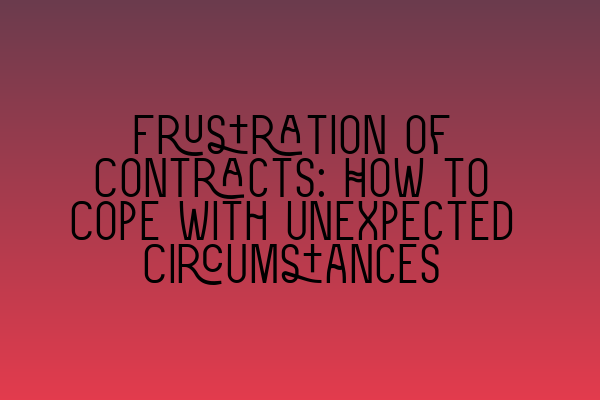Frustration of Contracts: How to Cope with Unexpected Circumstances
Contracts are legal agreements that bind parties to specific terms and obligations. However, sometimes unforeseen circumstances arise, making it impossible for one or both parties to fulfill their contractual obligations. This is known as the frustration of contracts. In this blog post, we will explore what frustration of contracts means, how it can affect parties involved, and the legal remedies available to cope with unexpected circumstances.
Understanding Frustration of Contracts
Frustration of contracts occurs when an unforeseen event or circumstance arises that renders the performance of a contract impossible, illegal, or radically different from what was originally agreed upon. This frustration is beyond the control of the parties involved and makes it unreasonable to expect them to continue fulfilling their contractual obligations.
The frustrating event must be one that was not anticipated by the parties at the time of the contract’s formation, and it must be sufficiently severe or fundamental to undermine the entire purpose of the contract. Examples of frustrating events include natural disasters, government intervention, death or incapacity of a party, and supervening illegality.
Effects of Frustration
When a contract is frustrated, it is considered terminated automatically. This means that neither party can sue for breach of contract or claim damages for non-performance. The parties are generally released from their obligations and are entitled to a refund of any money paid under the contract.
However, it is important to note that frustration does not affect any rights or liabilities that have already accrued before the frustrating event occurred. For example, if one party has already performed a part of their obligations, they may be entitled to payment for that portion of the work or service.
Legal Remedies
When a contract is frustrated, there are several legal remedies available to parties to cope with the unexpected circumstances. These include:
- Termination: As mentioned earlier, frustration automatically terminates the contract. Both parties are released from their obligations, and any money paid under the contract may be refundable.
- Alteration of the contract: In some cases, parties may be able to alter the terms of the contract to accommodate the new circumstances. This requires mutual agreement and may involve modifying deadlines, adjusting pricing, or changing the scope of work.
- Renegotiation: Parties may choose to renegotiate the contract entirely to account for the frustrating event. This involves reviewing and revising the terms and conditions to ensure fairness, considering the new circumstances.
- Force majeure clause: A force majeure clause is a contractual provision that addresses unforeseen events that may prevent or delay the performance of a contract. If a contract includes a well-drafted force majeure clause, it may specify how to handle frustration and the consequences for the parties involved.
Seeking Legal Advice
Dealing with frustration of contracts can be complex, and it is important to seek legal advice to understand your rights and options. A solicitor specializing in contract law can provide expert guidance tailored to your specific situation. They can review the terms of your contract, assess the frustrating event, and advise you on the most appropriate legal remedies available.
If you are preparing for the SQE exam, it is beneficial to have a solid understanding of contract law, including the concept of frustration of contracts. Practice with SQE sample papers to enhance your knowledge and prepare for exam success. Adjusting your SQE strategy based on mock performance can also help you improve your approach. Engaging in peer discussions post-mock can provide opportunities for collaboration and feedback, ensuring a comprehensive learning experience. Strengthening weak areas in SQE through targeted practice is another effective way to improve your overall performance.
Remember, contract law is a fundamental aspect of legal practice, and staying updated on key concepts like frustration of contracts is essential for solicitors and aspiring legal professionals alike.
For more information on SQE sample papers, adjusting your SQE strategy based on mock performance, peer discussions post-mock, adjusting strategy based on mock performance, and strengthening weak areas in SQE, feel free to explore the related articles listed below:
- SQE Sample Papers: Practice for Exam Success
- Adjusting Your SQE Strategy Based on Mock Performance
- Peer Discussions Post-Mock: Learning from Collaboration and Feedback
- Adjusting Strategy Based on Mock Performance: Improving Your Approach
- Strengthening Weak Areas in SQE: Targeted Practice for Improvement
By familiarizing yourself with these resources, you can enhance your understanding of contract law and improve your chances of success in the SQE exam.
